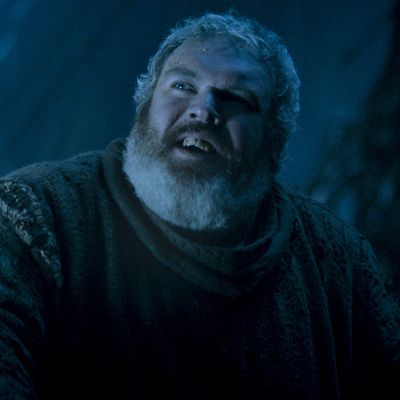
And just like that, Game of Thrones took away one of the few pieces of light and warmth in its gloomy universe. Sunday night’s episode, “The Door,” didn’t merely kill off Hodor, the beloved, simpleminded stable boy, it also revealed how he got that way — thanks to Bran Stark’s ventures into the slipstream of time, Meera Reed’s screams for the gentle giant to “Hold the door” against an army of wights echoed back through the decades, causing a mental break in Hodor’s teenage self that left him unable to utter anything but a mangled version of the phrase. Did you, viewer, enjoy repeating the word “Hodor” over and over to your friends? Well congratulations, turns out you’ve been celebrating one of Game of Throne’s greatest tragedies this whole time.
What exactly happened to Hodor? (To make things clearer, we’ll call his adult self “Hodor,” and his younger self his birth name, “Wylis.”) The show wasn’t quite clear on the specific details of what went down — the main takeaway is that Wylis got caught in the crossfire of Bran’s wibbly-wobbly, timey-wimey stuff — but if you’re looking for more details than that, here’s the explanation I’ve found most convincing:
When the Night’s King and the White Walkers arrive at the cave, Bran is visiting Winterfell in a vision, seeing the day his father left to get fostered in the Vale. In the present, Meera sees the White Walkers and runs back to Bran’s physical body, telling him to warg into Hodor — who is huddled in a corner, too scared to move — to help them escape. (In the books, Bran’s periodic journeys into Hodor’s mind are treated as a serious moral breach, a subtext that doesn’t quite make it into the show.) While still in the past, Bran hears Meera’s command and briefly wargs into teenage Wylis, directly from the vision, which opens up a link in Wylis’s brain between what’s happening in the cave and what happened at Winterfell. It’s through this link that Wylis hears Meera saying, “Hold the door,” and the terrible psychic stress of receiving a message from the future is what breaks his brain.
Does this mean that Bran has the ability to change the past? It’s complicated. When Bran’s in his visions, he’s not merely seeing a 3-D movie of the past, he’s actually there in some capacity. At the Tower of Joy, Ned Stark could briefly sense his presence, and on Sunday, the Night’s King not only saw Bran in a vision, but was able to touch him, too. But there’s a limit to what he can change. Game of Thrones appears to subscribe to the single-timeline theory of time travel: If Bran affects the past, whatever he changed already happened before he went back in time.
This has led to some crazy fan theories about which other events in the history of Westeros Bran’s been responsible for. The wildest is one I don’t necessarily agree with, but think is interesting nonetheless: that Bran’s attempts to avert Robert’s Rebellion are actually what made the Mad King go mad. I don’t quite buy it for a few reasons — Bran’s interest so far has been in observing the past, not trying to change it, and the events of Sunday night should only push him further down that path. Plus, like a lot of fan theories, it seems a little too neat for my taste: The universe seems smaller if every major event in history was because of Bran.
Speaking of things that might be a little too neat, let’s shift our focus back to Hodor and “Hold the door.” The books have not yet revealed how Hodor got the way he was, and given the vast amount of ground the forthcoming novels need to cover, it was not near the top of the list of mysteries fans expected to get an answer to. (Although this joke on a message board from 2008 ended up being close to the truth.) If you would have asked me Sunday night, I would have said that “Hold the door” was so melodramatic — in a good way — that it must have been a show invention, but that just serves as proof I should not attempt to predict anything about Game of Thrones ever: According to this week’s “Inside the Episode” segment, Hodor’s origin story came straight from the mind of George R.R. Martin himself. As executive producer David Benioff recalled, “We had this meeting with George R.R. Martin, where we were trying to get as much information as possible from him, and probably the most shocking revelation he had for us was when he told us the origin of ‘Hodor.’ … I just remember [executive producer] Dan [Weiss] and I looking at each other like, Holy shit.”
However, there are hints that whatever happens to Hodor in the books may differ from the show’s version. As Weiss put it: “It was just one of the saddest and most affecting things, sitting in a hotel room, having somebody tell you in the abstract … that “Hold the door” was the origin of the name Hodor.” That’s just general enough to make it seem like Hodor’s story might have a different ending in the books: When The Winds of Winter finally comes out, might Hodor be holding a different door?


